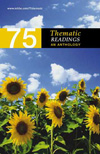
Camille Paglia |  |
Camille PagliaCamille Paglia, "Rape and Modern Sex War" Camille Paglia (1947- ) was born in Endicott, New York and earned
a B.A. from the State University of New York, Binghamton in 1968 and both
an M.Phil. (1971) and a Ph.D. (1974) from Yale University. She has taught
at Bennington College, Yale University, and at the University of the Arts
in Philadelphia since 1984. Her controversial and bestselling books include
Sexual Personae: Art and Decadence from Nefertiti to Emily Dickinson
(1990), Sex, Art, and American Culture: Essays (1991), and Vamps
and Tramps: New Essays (1994). Paglia's also written a study of the
Alfred Hitchcock classic, The Birds (1998). Paglia's writing frequently
appears in such periodicals as Sight and Sound, the Wall Street
Journal, and the Chronicle of Higher Education. "Rape
and Modern Sex War" takes a divisive look at date rape. It was first
published in Newsday in 1991, caused something of a national furor,
and was reprinted in Sex, Art, and American Culture. | QUESTIONS FOR DISCUSSION | CONTENT - According to the author, generally, how has traditional feminism
"put young women in danger"?
- To what does the author compare date rape in paragraph two?
- Which penalties for rape does the author discuss?
- Describe the plot of the 1960 film Where the Boys Are.
- According to Paglia, what is wrong with saying, "Rape is a
crime of violence but not of sex"?
- What relationship between sexual arousal and language does the
author describe?
- What does Paglia mean when she writes, "The old double standard
protected women"?
STRATEGY AND STYLE - To what does Paglia compare traditional feminists' views of sex
in paragraph six? What imagery does this comparison evoke? How does
this relate to the author's views about feminists?
- Discuss this reading as either a comparison/contrast essay or as
a definition essay. In either case, make sure you address all necessary
terms and discuss the nature of the author's support for her main points.
- The original title of this piece was "Rape: A Bigger Danger
than Feminists Know." Which title is more effective? Explain. Speculate
as to why the author changed it.
- Study the language in paragraph eight in order to describe the
author's tone there. Which specific words can you point to make your
case? Is this tone consistent throughout the essay? Explain.
| ENGAGING THE TEXT | - In general, how well do you get along with the opposite sex? Are
there certain topics you seem to have difficulty addressing in this
regard? How might your own communication with the opposite sex have
influenced your reading?
- How do you define the term "sexual politics"? How can
you relate your definition to your reading?
| SUGGESTIONS FOR SUSTAINED WRITING | - Can Paglia be called a feminist? Write an essay that studies Paglia's
departures from traditional feminism. Use material from your reading
and your own thoughts to explain whether her departures are reasonable
ones.
- Are the sexes at war, as Paglia says? If they are, does your notion
of the war differ from hers? If they're not, what are they up to? In
either case, explain using your reading and your own observations.
| FOR FURTHER RESEARCH | Do some research about date rape, covering the period from when this
article was written to the present. Pick one college campus to focus your
study, and answer these questions: What statistical trends about the reporting
of date rape are apparent? How, if at all, have the school's policies
about date rape changed over this time? What kinds of programs and services
have been implemented? | WEB CONNECTION | Looking for a good place to start learning more about this author online?
These Paglia links
leading to articles by and about her, reviews, and other sites are a good
place to begin. | LINKS | Biographical This page
has a brief biography of the author. How confident would you be using
this information in a paper about Paglia? Explain. Compare this longer biography
to the one above. What things are mentioned here that the one above
leaves out? What do you think accounts for the difference?
Bibliographical For a wide variety of writings Paglia has done for Salon.com, with
topics ranging from some musings about George W. to the aesthetic problems
of The Sopranos, take a visit to this page. Here's the transcript
of an online interview Paglia did for AOL on the occasion of the publication
of her book Vamps and Tramps. Among other things, she discusses
why she's pro-porn and why she chose the screename Volsci.
Cultural Looking for a quote by Paglia to use in a paper? This page
has a lot of them, organized by book. Interested in putting Paglia's work into the broader cultural context
of feminist literature? This page
of literary resources about feminism and women's literature will help
you do just that. Speaking of feminism, this Time magazine article
takes a look at the state of the movement in the 1990s. In what context
is Paglia mentioned here? Now that you know more about her, what do
you think of this reference?
|
|
|
|